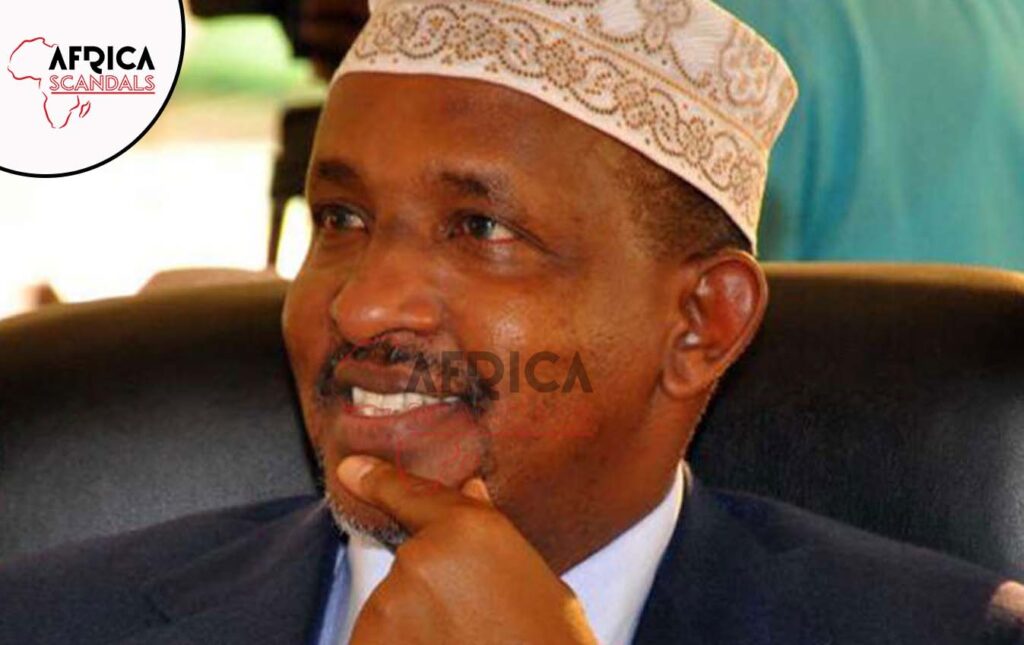The NHIF multi-billion scandal has rocked Kenya’s healthcare system, highlighting deep-seated corruption and the urgent need for reforms. Central to this scandal is Abdul Galgalo Munishram, a close ally of Aden Duale. This article delves into the intricacies of the scandal, revealing how powerful political connections facilitated a grand theft and left Kenya’s healthcare system in disarray.
Overview of the NHIF Scandal
The NHIF scandal came to light on November 28 when the Anti-Corruption Court Chief Magistrate Francis Andayi released NHIF CEO Geoffrey Gitau Mwangi and acting Finance Director Wilbert Kiplangat Kurgat on a Sh1 million bond each. The duo faced charges of conspiracy to defeat justice and disobedience of a lawful order. However, the charges seemed superficial, raising the question: who is behind the theft of close to Sh2 billion from NHIF?
Key Figure: Abdul Galgalo Munishram
Abdul Galgalo Munishram, a name that might have slipped under the radar, is a key figure in this scandal. As the Director of Messer’s Munshiram International Business System, Munishram’s company was contracted by NHIF to implement a biometric system aimed at revolutionizing healthcare access in Kenya. His close ties with Aden Duale, a prominent political figure, positioned him at the center of this grand scheme.
NHIF’s Ambitious Biometric System Plan
The biometric system plan was an ambitious project announced by the former CEO, Geoffrey Mwangi. NHIF aimed to register all civil servants into a database that the biometric system would refer to, fitting 1,370 hospitals with biometric kits. The goal was to make healthcare access seamless, with patients only needing to place a finger on a machine to receive services. The plan sounded promising and was expected to transform healthcare delivery.
The Involvement of Cartels and the Rift Valley Connection
As with many lucrative tenders, cartels quickly took interest in the NHIF biometric system project. Billionaire businessman Abdul Galgalo Munishram, a long-time business partner of Aden Duale, became involved. A credible source revealed that Munishram was introduced to a senior Rift Valley politician at an exclusive residence in Karen. What began as a legitimate business deal quickly turned into a scandal, with powerful government officials demanding Sh400 million from Munishram. He agreed on the condition that NHIF make advance payments to facilitate the importation of the biometric systems.
Advance Payments and Unfulfilled Promises
Despite NHIF making full payments for the supply and installation of the biometric systems across the country, only four hospitals were fitted. Over three years, Abdul Galgalo Munishram evaded multiple attempts by NHIF’s CEO to fulfill the contract, disappearing without delivering the promised systems. This failure to deliver raised serious questions about the integrity of the procurement process and the accountability of those involved.
Scapegoats: Geoffrey Mwangi and Wilbert Kurgat
The arrest of Geoffrey Mwangi and Wilbert Kurgat, charged with conspiracy to defeat justice and disobedience of a lawful order, seems like a diversion from the real issue. These charges suggest an attempt to cover up the true extent of the scandal, making them scapegoats for a much larger corruption network. The real masterminds behind the theft remain unscathed, protected by their political connections.
Government Involvement and Political Connections
The NHIF scandal highlights the involvement of high-profile politicians and business figures in corrupt practices. The demand for kickbacks and the subsequent disappearance of funds indicates a well-coordinated scheme, reflecting a broader pattern of corruption within government circles. The influence of these powerful individuals has made it difficult to hold the true culprits accountable.
The Fallout from the Scandal
The NHIF scandal has had far-reaching implications for Kenya’s healthcare system. The failure to implement the biometric system as planned means that many Kenyans continue to face difficulties accessing healthcare services. The loss of billions of shillings has further strained NHIF’s resources, exacerbating the challenges in providing affordable healthcare.
Public Outrage and Demand for Accountability
The scandal has sparked significant public outcry, with Kenyans demanding accountability and transparency from their leaders. The release of Mwangi and Kurgat on bond has intensified these calls, as many believe that the real culprits remain at large. Public protests and demands for justice underscore the need for systemic changes to address corruption.
The Future of NHIF and Healthcare Reforms
The NHIF scandal underscores the urgent need for reforms in Kenya’s healthcare system. Ensuring transparency and accountability in government contracts is crucial to preventing similar incidents in the future. Despite the setbacks, the successful implementation of the biometric system could still transform healthcare access. However, it requires a concerted effort to address the corruption that has plagued the project so far.
The NHIF multi-billion scandal involving Abdul Galgalo Munishram and other high-profile figures is a stark reminder of the pervasive corruption in Kenya’s public sector. While the arrests of Geoffrey Mwangi and Wilbert Kurgat might suggest some progress in the fight against graft, the real challenge lies in holding the true masterminds accountable and ensuring that such scandals do not recur. The public’s demand for justice and transparency must be met with decisive action from the government.

